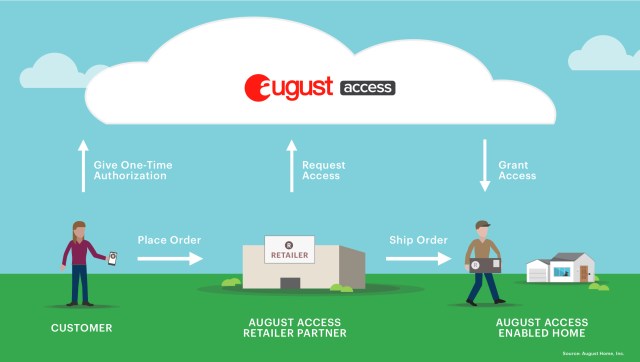A couple weeks ago, Walmart announced an agreement with August Home and Deliv to create a direct-to-fridge delivery service. The idea is to use August’s smart access technology to grant temporary access to a delivery person to place the groceries inside a customer’s fridge.
And last week, word leaked that Amazon was also working on its own direct-to-fridge delivery effort by developing a smart doorbell (one would assume the doorbell would also connect an electronic access control product like a smart lock). Both efforts are intended to add extra convenience for consumers and address the problems of unattended delivery.
This got me to thinking: as the epic battle for the future of grocery delivery extends from our doorstep and into our icebox, how many of us will let total strangers into our homes for a little extra convenience?
According to a survey conducted by NextMarket Insights on behalf of Comcast/August Home in early 2016, about 30% of online consumers said they would give temporary access to a service professional such as a house cleaner or delivery person. While that’s well below a majority, it’s probably enough to encourage Amazon and Walmart that there’s a market for this.
And there should be. The problems of “unattended delivery” are real; food left on your porch can get stolen or spoil, particularly if you spend long stretches of time at work or outside the home. There are many consumers who would gladly adopt technology such as a smart doorbell/smart lock if it meant their groceries were safe and cold when they got home.
Still, I’m not completely sure if we’ll ever see a majority of Americans trusting enough to let complete strangers into our homes. My wife and I have had home cleaners come twice a month for about a decade, but I didn’t feel comfortable with them being alone in our homes until after a year or so had passed and I got to to know them personally. How many of us ever get to know our grocery delivery guy?
Historically as consumers, our comfort levels rise as we get more accustomed to new situations enabled by technology. Take Uber or Airbnb. Ten years ago most of us would have scoffed at the idea at getting into a strangers car or sleeping in a person’s home. Now it’s considered perfectly normal.
But will we ever have that same level of comfort with unattended access? It’s our home, after all, not someone else’s. My guess is that slightly more consumers will get comfortable with the idea of letting strangers into their homes, but not a whole lot more.
And that’s probably fine with Walmart and Amazon, both of which are working on other alternatives such as grocery pickup, drones and locker access. And who knows, maybe Amazon is working on refrigerated version of a storage locker us less trusting types could install our our doorstep.



 For Walmart, this provides a final last-100-feet solution that could be valuable for consumers. The challenge will be taking this offering and scaling it to a wider audience. In Silicon Valley (where the trial is taking place), smart locks are probably pretty common. In Arkansas, probably not as much. One eventual solution could involve Walmart subsidizing the cost of a smart lock when delivery customers sign up for a year of home delivery.
For Walmart, this provides a final last-100-feet solution that could be valuable for consumers. The challenge will be taking this offering and scaling it to a wider audience. In Silicon Valley (where the trial is taking place), smart locks are probably pretty common. In Arkansas, probably not as much. One eventual solution could involve Walmart subsidizing the cost of a smart lock when delivery customers sign up for a year of home delivery.